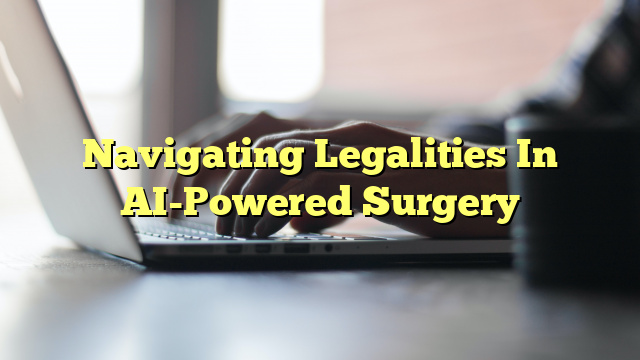Table of Contents
Ethical and Legal Considerations in AI
Artificial Intelligence (AI) has revolutionized various industries, including healthcare. However, with this advancement comes ethical and legal considerations that need to be addressed.
From an ethical standpoint, AI-powered surgery raises questions about patient autonomy, privacy, and consent. The use of AI algorithms in surgical decision-making may impact a patient’s ability to make informed choices about their treatment. Additionally, the collection and storage of patient data for AI analysis must adhere to strict privacy regulations.
Legally, healthcare providers must ensure that the use of AI in surgery complies with existing medical malpractice laws. Liability issues may arise if an AI algorithm makes an error that leads to patient harm. Clear guidelines and regulations are necessary to determine who is responsible in such cases.
Legal Issues in AI-Enabled Healthcare
Using AI in healthcare introduces several legal challenges. One major concern is the potential for bias in AI algorithms. If these algorithms are trained on biased data, they may perpetuate existing healthcare disparities and discrimination.
Another legal issue is the ownership and protection of AI-generated intellectual property. The development of AI algorithms requires significant investment and expertise. Determining who owns the rights to these algorithms and how they can be protected is crucial for fostering innovation in AI-powered surgery.
Furthermore, regulatory compliance is essential when using AI in healthcare. AI systems must meet rigorous safety and efficacy standards before being implemented in surgical procedures. Compliance with data protection laws, such as the General Data Protection Regulation (GDPR), is also necessary to ensure patient privacy.
Ethical Considerations in AI Governance Policies
Developing AI governance policies requires careful consideration of ethical principles. Transparency and explainability are essential to ensure trust in AI-powered surgery. Patients and healthcare providers should have a clear understanding of how AI algorithms make decisions and the potential limitations of these systems.
Fairness and equity must also be prioritized in AI governance. AI algorithms should be designed to mitigate bias and avoid perpetuating existing healthcare disparities. Regular audits and evaluations of AI systems can help identify and address any biases that may arise.
Additionally, accountability and responsibility are crucial in AI governance. Clear guidelines should be established to determine who is accountable for AI algorithm errors or malfunctions. Adequate training and oversight of healthcare professionals using AI systems are necessary to ensure responsible and ethical use.
Legislation around AI
Legislation surrounding AI is still evolving, and different countries have varying approaches. In the United States, there is currently no specific federal regulation governing AI. However, existing laws related to privacy, data protection, and medical malpractice apply to AI-powered surgery.
On the international level, the European Union has taken steps to regulate AI. The EU’s General Data Protection Regulation (GDPR) sets strict guidelines for the collection and use of personal data, including data used in AI algorithms. The EU is also considering new legislation specifically targeting AI technologies.
Other countries, such as Canada and Australia, have also begun exploring AI regulation. These efforts aim to strike a balance between fostering innovation and protecting patient rights and safety.

